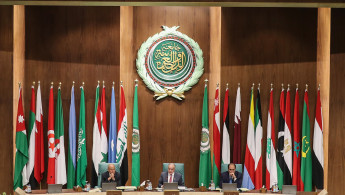Palestinians to soften criticism of Israel-UAE normalisation deal at Arab League summit
The PA initially described the UAE normalisation deal as a 'betrayal'.
2 min read
The Arab League will meet on Wednesday [Getty]
The Palestinian Authority (PA) will tone down criticism of the UAE over its normalisation deal with Israel at an Arab League summit on Wednesday, according to a draft statement viewed by Reuters.
President Mahmoud Abbas warned his diplomats attending the summit not to use offensive statements towards the UAE over the 13 August deal with Israel, which sparked outrage in both the Palestinian territories and on the Arab street.
"The trilateral announcement doesn't change the principal Arab vision based on the fact that the two-state solution on the 1967 borders is the only way to achieve peace in the Middle East," the watered down draft reads, according to the news agency.
The Secretary General of the Gulf Cooperation Council (GCC) Nayef Al-Hajraf on Monday demanded the PA apologise for the stern criticism directed at the UAE during this week's meeting of Palestinian factions in Beirut and Ramallah.
"The secretary general condemned the falsehoods questioning the historic stance of Gulf nations in support of the rights of Palestinians, calling on responsible Palestinian leaders who participated in that meeting, headed by President Mahmoud Abbas, to apologise for these violations and provocative and false statements, which are against the reality of the relations between the states of the Cooperation Council and the brotherly Palestinian people," a GCC statement read.
The meeting brought together various Palestinian parties to agree a united response to the UAE deal with Israel and efforts by the US to push more Arab states towards normalisation.
Bahrain has been tipped to become the next Arab state to announce it will formally establish ties with Israel.
President Mahmoud Abbas warned his diplomats attending the summit not to use offensive statements towards the UAE over the 13 August deal with Israel, which sparked outrage in both the Palestinian territories and on the Arab street.
"The trilateral announcement doesn't change the principal Arab vision based on the fact that the two-state solution on the 1967 borders is the only way to achieve peace in the Middle East," the watered down draft reads, according to the news agency.
The wording of the draft is significantly toned down from Abbas' initial criticism of the deal, describing it as a "betrayal" of the Palestinian cause and a "stab in the back".
The draft now states: "The trilateral announcement doesn't change the principal Arab vision based on the fact that the two-state solution on the 1967 borders is the only way to achieve peace in the Middle East."
The Palestinian draft states that the UAE-Israel agrement "doesn't diminish Arab consensus over the Palestinian cause, the Palestinian cause is the cause of the entire Arab nation".
The draft now states: "The trilateral announcement doesn't change the principal Arab vision based on the fact that the two-state solution on the 1967 borders is the only way to achieve peace in the Middle East."
The Palestinian draft states that the UAE-Israel agrement "doesn't diminish Arab consensus over the Palestinian cause, the Palestinian cause is the cause of the entire Arab nation".
|
Although no other Arab state has followed the UAE and normalised relations with Israel, criticism of Abu Dhabi - which broke consensus of the 2002 Arab Peace Initiative - has been muted.
"The secretary general condemned the falsehoods questioning the historic stance of Gulf nations in support of the rights of Palestinians, calling on responsible Palestinian leaders who participated in that meeting, headed by President Mahmoud Abbas, to apologise for these violations and provocative and false statements, which are against the reality of the relations between the states of the Cooperation Council and the brotherly Palestinian people," a GCC statement read.
The meeting brought together various Palestinian parties to agree a united response to the UAE deal with Israel and efforts by the US to push more Arab states towards normalisation.
Bahrain has been tipped to become the next Arab state to announce it will formally establish ties with Israel.





 Follow the Middle East's top stories in English at The New Arab on Google News
Follow the Middle East's top stories in English at The New Arab on Google News
![Netanyahu furiously denounced the ICC [Getty]](/sites/default/files/styles/image_330x185/public/2024-11/GettyImages-2169352575.jpg?h=199d8c1f&itok=-vRiruf5)
![Both Hamas and the Palestinian Authority welcomed the ICC arrest warrants [Getty]](/sites/default/files/styles/image_330x185/public/2024-11/GettyImages-2178351173.jpg?h=199d8c1f&itok=TV858iVg)
